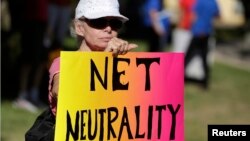A political fight is brewing in Washington over proposed changes to the way the Internet is regulated in the United States. One side wants rules to forgo plans to charge extra for certain heavy users. The other side says new regulations will slow the economic growth sparked by the Internet. Both sides say their particular approach encourages continued innovation.
Earlier this year, regulators proposed big changes in the way the Internet operates in the United States.
The Federal Communications Commission voted to offer a plan that could allow Internet Service Providers like AT&T, Verizon and Comcast to make deals with companies like Google and Facebook to provide them with faster paths for their content to consumers.
Competing factions
The plan is opposed by consumer groups, some Web companies, a majority of people questioned in a University of Delaware study, and U.S. President Barack Obama.
“Ever since the Internet was created, it has been organized around basic principles of openness, fairness and freedom. There are no gatekeepers deciding which sites you get to access, there are no toll roads on the information superhighway. This set of principles, the idea of net neutrality, has unleashed the power of the Internet and given innovators the chance to thrive. Abandoning these principles would end the Internet as we know it," said the president.
The Federal Communications Commission is an independent regulator, so Obama cannot just order the commissioners to make changes. On Monday, he tried to persuade them to regulate consumer broadband services like a public utility.
Concerns over changes
Economist and former FCC Commissioner Harold Furchtgott-Roth, said this industry contributes hundreds of billions of dollars to the economy, and calls new regulations unnecessary and unwise.
"American online companies are the leading online companies in the world in practically every field. I think that is in part a result of our lighter regulatory approach relative to a lot of other countries," said Furchtgott-Roth.
He said proposals to regulate the Internet as if it was a phone company would interfere in many decisions -- like pricing and relations with customers -- that are better left to the entrepreneurs who run the business.
The former regulator said even the threat of new rules discourages the investments needed to sustain the innovation that turned the Internet into an engine of economic growth. Many of his views on Internet regulation are shared by some Republican members of Congress and the U.S. Chamber of Commerce, which speaks for many major businesses.
The issue seems likely to be one that regulators, the courts and Congress will fight over in the months ahead.




